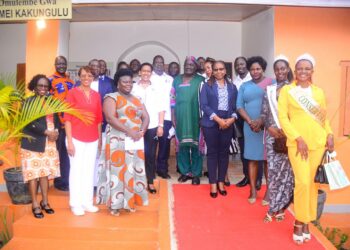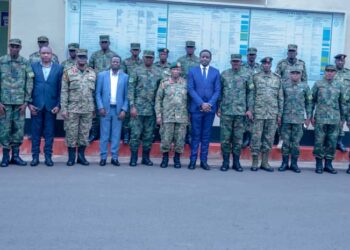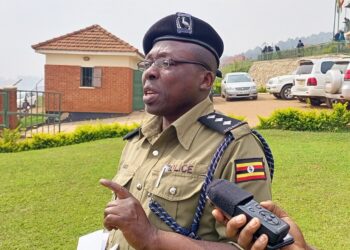Despite the looming legal battle, the Government of Botswana is adamant that it has dealt justly with the Russian mining giant Norilsk Nickel, and so is prepared defend its position, SHARON TSHIPA writes
Moreri Moesi, the Chief Public Relations Officer of the Ministry of Mineral Resources, Green Technology and Energy Security (MMGE) refuted claims by Norilsk Nickel that the recent Botswana court’s judgement effectively attempts to preclude it from defending its rights in the London Court of International Arbitration (LCIA) – their contractually agreed forum at which disputes should be resolved.
“Under Botswana law, any legal action against an insolvent company can only be pursued after obtaining leave of the High Court of Botswana to do so. Such legal provisions are common around the world. The High Court determined that Norilsk had not complied with the legal requirements referred to above, and dismissed the matter. The government has never precluded Norilsk from taking any legal action it deems fit,” explained Moesi.
Norilsk Nickel, the world’s largest refined nickel and palladium producer, maintains that it followed all the right channels, and so it confirmed that using every avenue available, it will continue with the litigation over the Nkomati and Tati facilities in Botswana. The efforts mean to recover around USD277 million debt by BCL, a state-owned enterprise, which it says failed to make a payment under the share purchase agreement and was subsequently forced by the Botswana Government into liquidation.
“We applied to the Botswana court for permission to defend our rights in London in 2016. For no good reason, it then took the court over 16 months to consider this very straight-forward matter. We are now left with a deeply unsatisfactory judgment which has denied us the ability to get on and resolve this dispute through impartial, international arbitration, despite our right to do so under our contract with BCL,” said Michael Marriott, Group CEO of Norilsk Nickel Africa, as recently quoted in his company press release. Marriott highlighted that Norilsk is disappointed by the Botswana court’s ruling and remains dismayed by Botswana’s authorities’ disdain for investors’ rights.
The Botswana Government however is adamant that the BCL mining company was placed into liquidation as it was fatally insolvent, and without further significant injections of funding, hence was unable to continue operating.
“Prior to liquidation, the government had considered requests by BCL for additional funding, and concluded that it could no longer provide financial support due to budgetary constraints,” said Moesi. Notwithstanding the legal matter currently in progress, to amicably resolve this issue, Moesi said Norilsk is entitled to pursue a sale of its interests to a third party, and in the event it has suffered damages as a result of BCL not performing under the agreement, it would be entitled to make a claim against BCL under the insolvency laws. In an effort to end the saga, on March 9, 2018, former Minister of Mineral Resources, Green Technology and Energy Security of Botswana Sadique Kebonang announced that Botswana had paid USD45mln to Norilsk as per the presidential directive of January 24, 2018, but the company negates ever receiving such funds.
The contractual relationship between Norilsk and BCL began in October 2014 when the two parties signed the share purchase agreement, which provided for the transfer of the ownership of the Nkomati and Tati facilities to BCL. In September 2016 the agreement became unconditional. BCL however subsequently failed to perform its deal completion obligations and did not make a payment for the shares. As a result, Norilsk served a material breach notice on BCL, demanding payment of the USD277 million purchase price. On October 9, 2016, the government applied to the High Court of Botswana, and BCL entities were put into liquidation. Eight months later, in June 2017, BCL entered the final stage of liquidation. In the following months, Norilsk submitted a ‘Request for Arbitration’ to the LCIA to determine its claims and filed an application with the Botswana court (the “Permission Application”) seeking permission to commence and prosecute an arbitration in the LCIA in respect of its claim. On April 18, 2018, the Permission Application was heard in Botswana and, on June 21, 2018, the judgment which Norilsk purports precludes it from taking the case to LCIA was handed down.
To this end, Norilsk filed a reckless trading claim against the Government of Botswana, declaring it responsible for the liabilities of BCL entities, and is now further determined to seek legal intervention, following the Botswana court ruling it views as muddled. The government however, does not consider itself party to any contractual dealings with Norilsk in relation to the said acquisitions. The purported transactions, as far as the government is concerned were of a commercial nature, between two commercial entities, being BCL and Norilsk.
The Botswana Government has a long track record of satisfactorily upholding the rule of law, being transparent and fair, hence the current contention with Norilsk has come as a shock to many. Some, including Save Botswana, foresee the conflict potentially tarnishing the reputation of Botswana as an investment destination.
“The government remains committed to creating a conducive environment for investors, and as such issues before the courts are independently dealt with by the judiciary, said Moesi, adding that Norilsk is entitled to exercise its legal rights, and where necessary, the Botswana Government will defend its position.
The closure of the mine has left many residents of Selibe Phikwe, the town where BCL is located, jobless. Up to 6 000 people were retrenched, living only 400 employees to care and preserve the BCL and Tati mines. Western Kebepile, is one of the employees that lost their jobs. Kebepile joined BCL in 1988 until its closure. BCL sponsored his studies, he graduated as an artisan in Heavy Plant Mechanics, his work for a while dealt with maintenance of earth moving machines. By the time BCL was shutdown he was working as a Dispatch responsible for assert utilisation. As far as the government’s strife with Norilsk is concerned, Kebepile is of the view that the government should engage with the Russians and opt for an out of court dialogue and financial settlement because it is clear that the government of Botswana owes the Russians. The government he said failed to behave responsibly.
The untimely closure of the mine he said affected him negatively. “All my plans were disrupted big time. I am 50 years old now, I was preparing for my retirement at 60. That plan is no more as I don’t have a consistent income,” shared Kebepile. Adding that the lives of people in Phikwe were drastically changed for the worst. “People have lost their lives due to the closure, families have been broken, children’s education has been disturbed as some have had to move from private to government schools, ex-employees are being handed to sheriffs by banks they owe; they are repossessing asserts because loans are in areas,” he said, calling on the government to focus on the SPEDU region, where BCL is located, with unwavering commitment that will translate to a positive impact.
To rectify the situation threatening socio-economic development in the SPEDU region, the government is working on diversifying its economy, and attract both local and foreign investors. Opportunities that Botswana is selling in general range from the commercialisation of agriculture, manufacturing, energy, transport, tourism and construction to cite a few.
As part of the efforts, despite what some consider to be a potentially image tarnishing case with Norilsk, President Mokgweetsi Masisi early this month led the Botswana delegation to the Beijing Summit on China-Africa Cooperation. The journey that saw Masisi make the front page of the People’s Daily at the summit followed the China Botswana Investment Forum, an event at which Chinese investors were invited to consider investing in the SPEDU region, and elsewhere in the country.
The two nations’ tightening ties comes at a time when Unites States (US) and China trade wars are escalating. A time when US top officials are accusing China of overloading poor nations with debt through large-scale infrastructure projects that are not economically viable. An opinion piece that was recently published by The Washington Times accused China of making the task of bringing the African continent into the 21st century difficult. Continued dictatorship and corruption in Africa is attributed to Chinese influence. Regardless, the Botswana government is committed to China as it believes will benefit its people.
The future of BCL is currently in the hands of a liquidator who is responsible for winding up the affairs of the company. This includes selling the assets – including the mineral rights – in due course and in accordance with the insolvency laws. The liquidator is mandated to identify a suitable investor who is in a position to acquire the assets of BCL with a view to recommencing mining operations someday. –END-
Do you have a story in your community or an opinion to share with us: Email us at editorial@watchdoguganda.com











